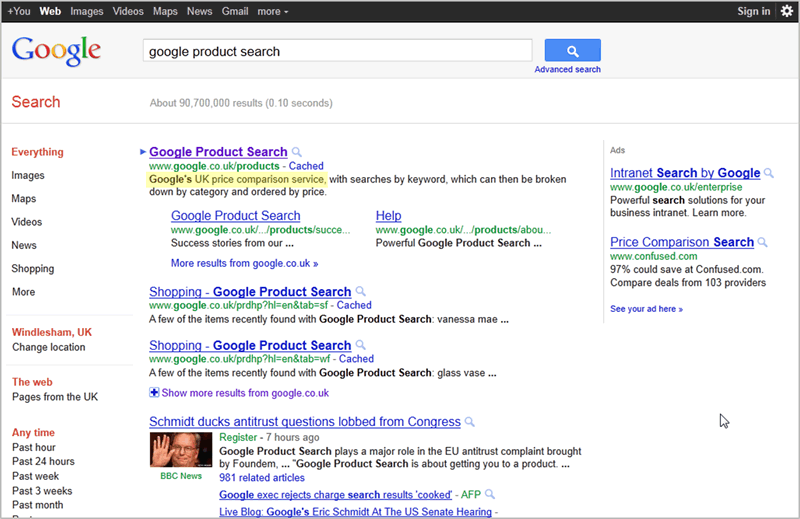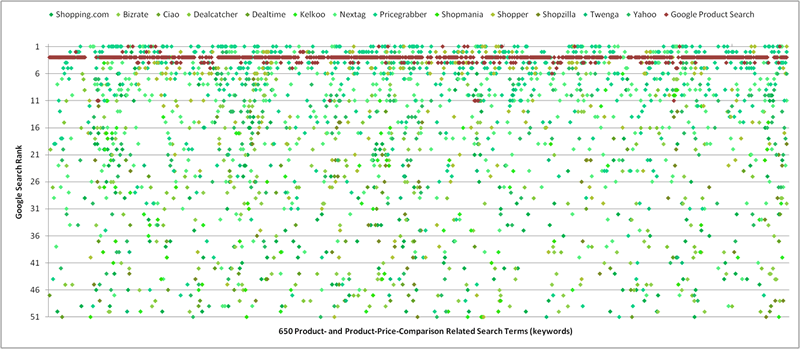The Google Bamboozle: Deconstructing Google’s Written Response to the Senate Antitrust Subcommittee
Last Friday, November 4, Google Executive Chairman Eric Schmidt submitted his written response to questions posed by the Senate Antitrust Subcommittee, following his testimony before the Committee in September.
Foundem’s Video deconstructing key elements of Mr Schmidt’s testimony before the Senate Antitrust Subcommittee in September 2011 (See here for the original full-length version of this video)
In a traditional bricks and mortar world, Google’s anti-competitive practices would be obvious to all. But in the unfamiliar and seemingly impenetrable world of Internet search, these practices are often predicated on Google’s ability to bamboozle, confuse, and obfuscate.
Behind closed doors, Google’s confuse-and-conquer strategy has been unravelling for over a year. Now, Mr Schmidt’s public testimony and written answers to the Senate Antitrust Subcommittee provide the first public glimpse of the extent to which Google’s paper-thin defence crumbles in the face of informed scrutiny.
A few of Mr Schmidt’s written answers seem gratuitously evasive. Many are markedly at odds with Google’s existing documents and prior statements. And some are just plain wrong.
The significant inconsistencies and inaccuracies in Mr Schmidt’s testimony at the hearing have only been amplified by those in his written answers. Taken together, the two misleading and often contradictory accounts seem to reveal a company beginning to sense that it has already lost the argument.
We suggest that our recent video (above), which deconstructs several key elements of Mr Schmidt’s testimony, is essential viewing for anyone wanting a better insight into some of the breathtaking semantic acrobatics of Mr Schmidt’s testimony and written responses.
The following are just two examples of Mr Schmidt’s problematic written answers following the hearing:
Is Google Product Search a Price Comparison Service?
During the hearing, Senator Lee referred extensively to a Foundem study examining the comparative Google rankings of the US’s leading price comparison services, including Google’s own Google Product Search. In the hearing, Mr Schmidt ducked several of Senator Lee’s questions about the troubling findings of this study with the bizarre claim that Google Product Search is not a price comparison service.
In our blog post immediately following the hearing we demonstrated the fallacy of this claim with evidence that included a screenshot of Google’s own description of Google Product Search as a “price comparison service”.
Senator Lee’s post-hearing follow-up question:
On September 28, 2011, a search query on Google for “UK product search” returned Google Product Search as the first result, described as “Google’s UK price comparison service.”
Is Google Product Search a price comparison service?
Mr Schmidt’s written response:
Google product search is a type of thematic search that allows consumers to compare prices and see which websites are selling a particular product.
In other words, “Yes.” As Mr Schmidt will be aware, all price comparison services can be described as “a type of thematic search that allows consumers to compare prices and see which websites are selling a particular product.”
It is difficult to understand how Mr Schmidt could have been so confused about this straightforward point during his original testimony. Google’s systematic favouring of its own price comparison service through Universal Search is an issue that has been central to formal antitrust investigations on both sides of the Atlantic for well over a year.
Does Google Favour its Own Services?
Although Mr Schmidt now concedes that Google Product Search is in fact a price comparison service, his written answers duck many of the same questions again – but this time by claiming that Google Product Search and other specialised Google services are not in fact “services”.
Senator Lee’s post-hearing follow-up question:
Are Google products and services subject to the same search-ranking algorithmic process as all other organic search results?
Mr Schmidt’s written response:
…what is crucial to understand is that thematic search results are not separate “products and services” from Google…Because of this, the question of whether we “favor” our “products and services” is based on an inaccurate premise. These universal search results are our search service—they are not some separate “Google content” that can be “favored.”…
Even if this were true, it would make no difference to the correct answer to the question. Whether Google Product Search, Google Maps, Google News, Google Places, Google Travel, Google Finance, and so on, are considered “services”, “products”, “off-shoots”, “sub-sections”, “sub-categories”, “thematic collections of search results”, “bananas”, or “hoojamaflips” makes no difference; as long as Google owns them, and profits from driving traffic to their pages, then what Google now chooses to call them is entirely irrelevant.
But of course, it isn’t true. Because these Google services are in fact “services”, no one should be surprised to learn that Google has consistently and repeatedly referred to them as such in all manner of places and circumstances. For example:
“The Google Product Search service is provided AS IS and Google expressly disclaims to the fullest extent permitted by law all express, implied, and statutory warranties regarding the information included therein. Under no circumstances shall Google be liable to any user on account of their use, misuse, or reliance on the Google Product Search service.“
Google’s About Google Product Search page, as of November 8 2011
And
“The Google Maps service includes search results such as business listings, images, and related information provided by third parties.”
Google’s Terms of Service for Google Maps, as of November 8 2011
Even Search Engine Land (which many have accused of being fervently pro-Google) was moved to take issue with Mr Schmidt’s claim:
“Google most certainly does have separate products and services, despite what Schmidt repeatedly told Congress today. It’s disingenuous, at best, for him to claim that YouTube, Google Maps, Google News and other Google products that appear as universal search results aren’t actually separate products. They are.”
Search Engine Land, November 4 2011
Unfortunately, Mr Schmidt repeatedly restates this claim to avoid answering several of Senator Lee’s related, post-hearing questions. For example:
Senator Lee:
Does Google display Google [Product Search] results within its natural search results without any label identifying them as Google results or as otherwise distinct from true “search results”?
Mr Schmidt:
As stated in my response to Question 1, universal search results are not separate “products and services”; they are our “true” results.
And
Senator Lee:
What has Google done to let its users know that its natural search algorithm gives preference to Google’s own products and services?
Mr Schmidt:
As described in my response to Question 1 above, I believe that the premise of this question is incorrect.
We suspect that, in time, Google will reflect on this period with a sense of shame and regret.
If Google can justify promoting its own services through Universal Search while demoting its competitors for the lack-of-original-content that is a defining characteristic of all search services, then why does it not simply stand up and say so?
We are quite certain this is a debate Google will ultimately lose. But it is a debate that should have started two years ago. It is time for Google to come clean and start arguing its position based on facts rather than on forever shifting fiction.


